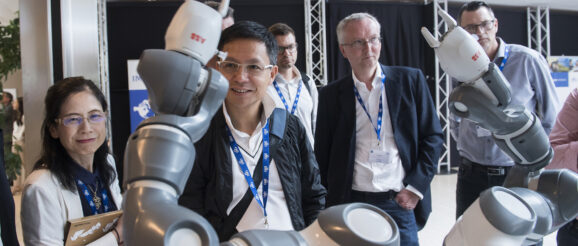Disruptive innovation – how executives are getting ready for the future – Horyou Blog

Every summer, hundreds of business leaders from all over the world gather in Lausanne for a 5-day marathon of learning and inspiration. The center stage is IMD, a world top-ranked business school. The so-called Orchestrating Winning Performance (OWP) program aims to reach their needs and concerns based on studies and researches from professors and partner companies about businesses and global markets.
This year, disruption and innovation were the keywords for most participants of OWP, which tool place in the last week of June. Facing a scenario where alternative business models are booming and new technologies are discovered daily, most executives are very concerned about their companies’ outcome. “Executives are familiar with the acronym VUCA that stands for Volatile, Uncertain, Complex and Ambiguous scenarios. What we are experiencing now is a layer above it. Our business environment is now APIE: Adversarial, Polarised, Irrational and Explosive”, says professor Tawfiq Jelassi, who gave the lecture “Leadership in High Turbulence Environment” to the executives.
Professor Jelassi has a remarkable experience both as a businessman and professor, but he became globally well-known in 2014, after taking over the Ministry of High Education in Tunisia, only a few years after the Arab Spring, when the country was still facing a highly unstable political and social situation. In his lectures to the IMD executives, he asserts that the post Arab Spring scenario and the current environment of business disruption are more connected that may first appear. He explains that technological innovations and new processes, human resources models and corporate philosophies are changing the very heart of many businesses globally in a even seen pace. It is, indeed, a revolution.
“We all have to develop ability to disrupt ourselves before somebody else does”, said Des Ferris, Managing Director of Kerring Fruits, an Irish fruit company, a participant of OWP. During the 5-day program, executives from all backgrounds were testing drones, 3d printing machines, virtual reality equipment and other brand new gadgets from the Global Center for Digital Business Transformation, based on IMD Campus. According to the president of IMD, Dominique Turpin, the objective was to give the business leaders the idea of what technologies can do for them – and also against them.
The main lesson for executives that are trying to understand and also lead their businesses in such a challenging situation is to develop a daring leadership. “You need to challenge yourself because we are in a business environment characterized by many high level changes, so the question to ask as a business executive or leader is: the world is changing. How about us? How about our company? They should have the courageous leadership to do things that are hard to do”, says professor Jelassi. Such leadership, according to him, requires also to trust and to give autonomy to teams, making them feel part of the community, creating a sense of belonging and solidarity.
After creating a trust community, the last and perhaps the most difficult challenge for businesses is to foster innovation – by creating an environment where failures are allowed and where at least part of the team is not focused on the day to day operation. “Businesses need to have a team where people are thinking about the future, not about how to reach quarterly results”, says Jelassi. Call it an innovation center or a laboratory, this is exactly the structure that the Tunisian government put in place during the one-year temporary mandate after the Arab Spring, managing to start the reforms people were protesting for years to have while the bureaucracy was working on daily tasks in a different building.
The lesson after one year of innovation, reforms, dialogue with a long term dissatisfied society and political pressure? “Survival should never be taken for granted, you need to work hard to achieve it. In a crisis time, leadership is about making hard choices, doing the unexpected, and sometimes the seemingly impossible”.
